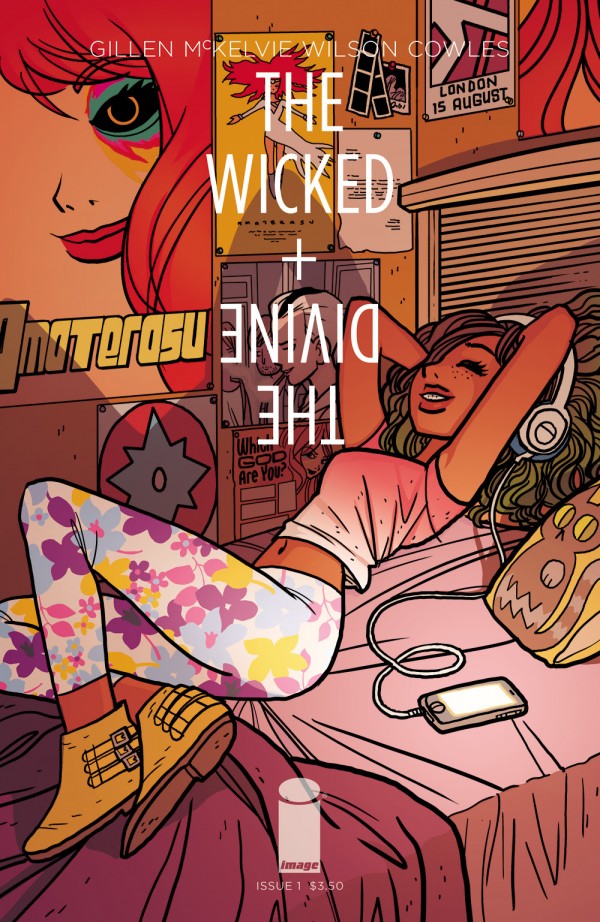Over the course of The Wicked + The Divine, Kieron Gillen, Jamie McKelvie, Matthew Wilson, and Clayton Cowles have distinguished themselves from the pack for their strong cover designs. The A-Covers, which for the first 11 issues featured close ups of characters’ heads before culminating in tragedy, earned McKelvie and Wilson an Eisner nomination this year. The B-Covers have not been tied by a common theme, but have instead become known as a place for artists to visually explore and reinterpret Team Wic+Div’s world.
Some great pieces from the first year include Brian Lee O’Malley’s interpretation of lead character Laura’s room:

and Kevin Wada’s exploration of The Morrigan’s and Baphomet’s underworldly relationship:

These pieces were beautiful, but neither of them were as abstract or patently absurd as the B-Cover to issue 14, illustrated by Canadian musician Grimes:
 Each issue of this arc focuses on an individual god. Issue 12 was centered around Inanna and August’s issue 13 introduces Tara, who has not been seen, only discussed (often disparagingly), up until now. The solicit for issue 14 hasn’t been released yet, so it’s anyone’s guess as to what this cover represents. If I had to guess, I’d say it references The Morrigan or a certain another god that was recently introduced…
Each issue of this arc focuses on an individual god. Issue 12 was centered around Inanna and August’s issue 13 introduces Tara, who has not been seen, only discussed (often disparagingly), up until now. The solicit for issue 14 hasn’t been released yet, so it’s anyone’s guess as to what this cover represents. If I had to guess, I’d say it references The Morrigan or a certain another god that was recently introduced…
Also, Grimes is ridiculous:
In 2009, Boucher (Grimes) and her then-boyfriend from Tennessee constructed a 20-foot houseboat named Velvet Glove Cast in Iron, with the intention to sail down the Mississippi River from Minneapolis to New Orleans. The cargo included food (chickens and 20 pounds of potatoes), a typewriter, and a gifted copy of Mark Twain’s Adventures of Huckleberry Finn. Unfortunately for the pair, the chickens caught the eastern equine encephalitis virus and perished soon into the trip, so their diet consisted mainly of potatoes. The couple adopted the names Veruschka and Zelda Xox for the trip. Due to their disregard for local boating regulations and the houseboat’s engine trouble, the journey was cut short, as the houseboat was impounded along with the food.
-from her Wikipedia entry
By Arturo Hernandez
Everyday I get asked why second language learning is so hard and what can be done to make it easier. One day a student came up to me after class and asked me how his mother could learn to speak English better. She did not seem to be able to breakthrough and start speaking. Perhaps you or someone you know has found learning another language difficult.
So why is it so hard?
There are a lot of explanations. Some have to do with biology and the closing of a sensitive period for language. Others have to do with how hard grammar is. People still take English classes in US high schools up to senior year. If a language were easy, then native speakers of a language would not have to continue studying it to the dawn of adulthood.
But what if we took a different approach. Rather than ask what makes learning a second language so hard, let’s ask what makes it easier.

One group of successful language learners includes those who write in a second language. For example, Joseph Conrad, born Józef Teodor Konrad Korzeniowski, wrote Heart of Darkness in English, a language he spoke with a very strong accent. He was of Polish origin and considered himself to be of Polish origin his entire life. Despite his heavy accent, he is regarded by many as one of the greatest English writers. Interestingly, English was his third language. Before moving to England, he lived in France and was known to have a very good accent in his second language. Hence, success came to Conrad in a language he spoke less than perfectly.
The use of English as a literary language has gained popularity in recent years. William Grimes, in a New York Times piece, describes a new breed of writers that are embracing a second language in literary spirit. Grimes describes the prototypical story that captures the essence of language learning, The Other Language from Francesca Marciano. It’s the story of a teenager who falls in love with the English language tugged by her fascination with an English-speaking boy. Interestingly, it turns out there is a whole host of writers who do so in their second language.
Grimes also considers the effects that writing in a second language has on the authors themselves. Some writers find that as time passes in the host country they begin to take on a new persona, a new identity. Their native land grows more and more distant in time and they begin to feel less like the person they were when they initially immigrated. Ms. Marciano feels that English allows her to explore parts of her that she did not know existed. Others feel liberated by the voice they discover in another language.
The literary phenomenon that writers describe is one that has been discussed at length by Robert Schrauf of Penn State University as a form of state-dependent learning. In one classic study of state-dependent learning, a group of participants was asked to learn a set of words below or above water and then tested either above or below water. Interestingly, memory was better when the location of the learning matched the testing, even when that was underwater, a particularly uncomfortable situation relative to above water. Similar explanations can be used to describe how emotional states can lead to retrieval of memories that are seemingly unrelated. For example, anger at a driver who cuts you off might lead to memories of the last time you had a fight with a loved one.
Schrauf reviews evidence that is consistent with this hypothesis. For example, choosing the same word in a first or second language will lead people to remember events at different times in their lives. Words in the first language lead to remembering things earlier in life whereas viewing a translation in a second language leads to memories that occurred later in life.
The reports of writers and the research done by Robert Schrauf and his colleagues help point to a key aspect that might help people learn their second language. Every time someone learns a new language they begin to associate this language with a set of new experiences that are partially disconnected from those earlier in life. For many this experience is very disconcerting. They may no longer feel like themselves. Where they were once fluent and all knowing, now they are like novices who are trying desperately to find their bearings. For others like Yoko Tawada, a Japanese native who now lives in Berlin and writes in German, it is the very act of being disconnected that leads to creativity.
Interestingly, the use of two languages has also served as a vehicle for psychotherapists. Patients that undergo traumatic experiences often report the ability to discuss them in a second language. Avoidance of the native language helps to create a distance from the emotional content experienced in the first language.
The case of those who write in their second language as well as those in therapy suggests that our identity may play a key role in the ability to learn a second language. As we get older new experiences begin to incorporate themselves into our conscious memory. Learning a second language as an adult may serve to make the differences between distinct periods in our lives much more salient. Thus, the report of writers and the science of autobiographical memory may hold the key to successful language learning. It may involve a form of personal transformation. For those that are unsuccessful it may involve an inability to let go of their old selves. However, for those who embrace their new identity it can be liberating.
It was precisely this point that I raised with the student in my class who sought advice for his mother. I explained that learning a second language will often involve letting go of our identities in order to embrace something new. But how do you get someone to let go of himself or herself? One way to achieve this is to start keeping a diary in an unfamiliar language. It is probable that writing may not only lead a person to develop better language skills but also carry other deeper consequences. Writing in a non-native language may lead someone to develop a new identity.
Arturo Hernandez is currently Professor of Psychology and Director of the Developmental Cognitive Neuroscience graduate program at the University of Houston. He is the author of The Bilingual Brain. His major research interest is in the neural underpinnings of bilingual language processing and second language acquisition in children and adults. He has used a variety of neuroimaging methods as well as behavioral techniques to investigate these phenomena which have been published in a number of peer reviewed journal articles. His research is currently funded by a grant from the National Institutes of Child Health and Human Development. You can follow him on Twitter @DrAEHernandez. Read his previous blog posts.
Subscribe to the OUPblog via email or RSS.
Subscribe to only brain sciences articles on the OUPblog via email or RSS.
Image credit: Young female student with friends on break at cafe. © LuckyBusiness via iStockphoto.
The post Does learning a second language lead to a new identity? appeared first on OUPblog.

Following on from Charlotte’s post the other day, I thought I would put together a list of a few of the books my family loves, which focus on that special bond between grandchildren and their grandparents.
 I have already talked about the Katie Morag books, in which both her grandmothers are central. I wish we’d known about Nigel Gray’s A Balloon for Grandad when we lived abroad; as it is, we discovered it recently in our local library. Illustrated by one of my favorite illustrators, Jane Ray, it deals in such an uplifting way with the separation which is sometimes inevitable when generations live a long way from each other. Then there are Ana Baca and Anthony Accardo’s Benito books – look out for a review of their latest bilingual title Benito’s Sopaipillas/ Las Sopaipillas de Benito in next week’s update of PaperTigers (I’ll add the link to this post when it’s available).
I have already talked about the Katie Morag books, in which both her grandmothers are central. I wish we’d known about Nigel Gray’s A Balloon for Grandad when we lived abroad; as it is, we discovered it recently in our local library. Illustrated by one of my favorite illustrators, Jane Ray, it deals in such an uplifting way with the separation which is sometimes inevitable when generations live a long way from each other. Then there are Ana Baca and Anthony Accardo’s Benito books – look out for a review of their latest bilingual title Benito’s Sopaipillas/ Las Sopaipillas de Benito in next week’s update of PaperTigers (I’ll add the link to this post when it’s available).
 We also love Raymond Briggs’ typically quirky story The Puddleman. You have to be an indulgent grandfather to allow your grandson to lead you around by a dog-lead attached to your wrist and call you “Collar” - but the hint at the end, where Briggs thanks “Miles” for “the naming of puddles, Collar” etc. would suggest that he had real-life, grandson inspiration for the story! It’s a loving, imaginative tale that also provides a particularly special read-aloud experience. Since it is a cartoon strip, you can’t just read it as a narrative; you have to share the interpretation of the pictures alongside the reading of the dialogue and build it up together.
We also love Raymond Briggs’ typically quirky story The Puddleman. You have to be an indulgent grandfather to allow your grandson to lead you around by a dog-lead attached to your wrist and call you “Collar” - but the hint at the end, where Briggs thanks “Miles” for “the naming of puddles, Collar” etc. would suggest that he had real-life, grandson inspiration for the story! It’s a loving, imaginative tale that also provides a particularly special read-aloud experience. Since it is a cartoon strip, you can’t just read it as a narrative; you have to share the interpretation of the pictures alongside the reading of the dialogue and build it up together.
Sometimes we need books to help us talk about the illness or death of a beloved grandparent. (more…)
 Each issue of this arc focuses on an individual god. Issue 12 was centered around Inanna and August’s issue 13 introduces Tara, who has not been seen, only discussed (often disparagingly), up until now. The solicit for issue 14 hasn’t been released yet, so it’s anyone’s guess as to what this cover represents. If I had to guess, I’d say it references The Morrigan or a certain another god that was recently introduced…
Each issue of this arc focuses on an individual god. Issue 12 was centered around Inanna and August’s issue 13 introduces Tara, who has not been seen, only discussed (often disparagingly), up until now. The solicit for issue 14 hasn’t been released yet, so it’s anyone’s guess as to what this cover represents. If I had to guess, I’d say it references The Morrigan or a certain another god that was recently introduced…






